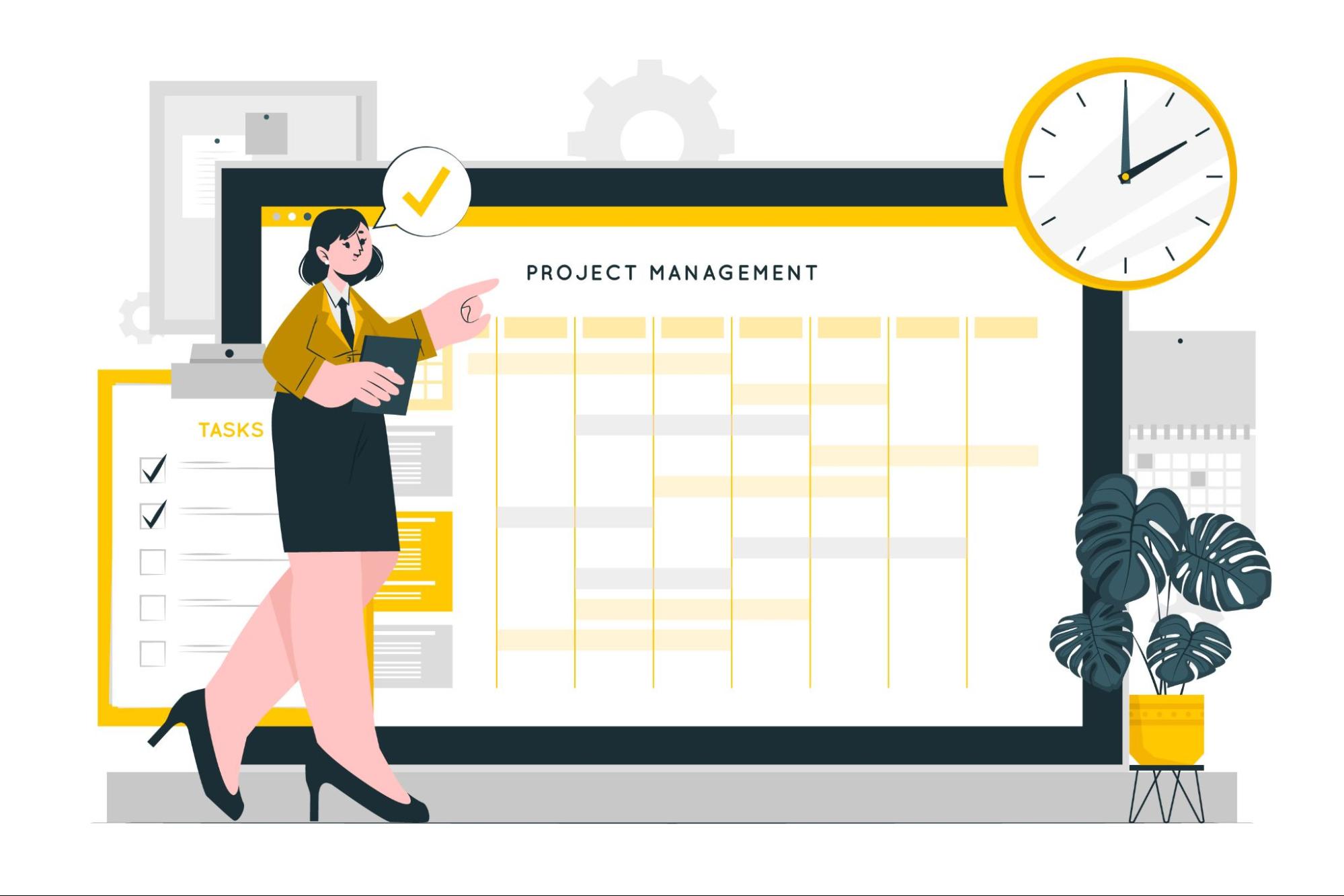While most people have a general idea of what a project is, creating and completing projects that drive organizational growth and success requires a more precise understanding. Given that many companies struggle to meet their project goals, it’s essential to clarify what a project involves and explore tools and strategies for effective project management. Let’s begin the content with the project definition.
What is a Project In Project Management?

A project is a collection of tasks and subtasks designed to achieve a specific objective, such as increasing conversions, launching a website, updating apps, or delivering products to clients. Key characteristics of a project include its temporary nature, defined start and end dates, and goal-oriented approach.
An organization might undertake projects to achieve various goals, such as increasing conversions, launching a new company website, updating existing apps or features, or delivering products to clients. Every project is temporary and has a clear start and end date.
To complete a project successfully, it is essential to have a project manager (PM) who can plan and delegate tasks, set deadlines, monitor progress, and make necessary adjustments.
Key Elements of a Project
Each project is composed of several crucial elements:
-
Goals: These are the desired outcomes to be achieved within a specified timeframe. For example, goals might include “launch the app by March 10” or “gain X new leads by September.”
-
Tasks: These are the specific activities assigned to team members, each with its deadline, that must be completed to move the project forward.
-
Timelines: Timelines provide clear start and end dates for individual tasks, helping project managers visualize the entire project from start to finish.
-
Milestones: These are significant events within the project timeline used to track progress. Examples include securing funding, obtaining stakeholder approval, or entering the testing phase for a new app.
-
Resources: Resources encompass everything needed to complete the project, such as personnel, budget, materials, and more.
-
Deliverables: Deliverables are the outputs produced during the project, such as reports, content, products, apps, or any items requested by the client.
-
Budget: The budget represents the total financial resources allocated for the project.
-
Stakeholders: Stakeholders are individuals or groups involved in or affected by the project. Internal stakeholders include project managers and team members, while external stakeholders might include contractors and suppliers.
-
Acceptance Criteria: These are the conditions that must be met for the project deliverables to be accepted by the client, such as ensuring a mobile app functions on both iOS and Android devices.
Once these elements are clearly defined, they are compiled into a project plan. This plan serves as a comprehensive guide for controlling and executing the project.
How to Successfully Manage a Project?

Successfully managing a project is a challenging endeavour. Even a minor misstep can lead to missed deadlines, with only 29% of organizations reporting that they consistently deliver projects on time. So, how can you effectively oversee a project from start to finish? How can you coordinate individual tasks and keep everything on schedule?
Five Tips for Successful Project Management
While each team may define project success differently, here are five essential tips for effective project management:
Proper Planning
Thorough planning is crucial for project success. Develop a comprehensive project plan that outlines objectives, methodologies, tools, and budget. Key to success are selecting the appropriate project management methodology and providing the right tools for your team. Additionally, flexibility is vital, as priorities may shift once the project is underway.
Select the Right Team Members
Choose team members who are best suited for the project's critical roles. This might involve assigning specific tasks to individuals based on their expertise or designating team members to lead particular phases of the project. Ensuring that the right people are in the right roles is essential for project efficiency and success.
Clear Communication
Effective communication is essential for keeping everyone on the same page. Project managers should ensure that all team members understand project goals, progress, tasks, and updates. Fostering effective communication among team members is equally important. Utilizing a centralized communication platform, such as Monday.com, can streamline work-related discussions.
Use Milestones to Track Progress
Milestones serve as indicators of project progress. Meeting milestones on time suggests that the project is on track, while missed or delayed milestones may signal the need for managers to reassess and address any issues. Regularly tracking milestones helps keep the project aligned with its goals.
Evaluate Performance and Make Adjustments
Real-time data on Key Performance Indicators (KPIs) is vital for project management. KPIs typically relate to timeline, budget, quality, and effectiveness. Despite their importance, more than half (54%) of surveyed project managers lack access to real-time project KPIs. Using software that provides real-time data allows project managers to promptly identify and resolve issues, ensuring the project stays on course.
Project framework vs project methodology
A project framework is a structured approach that outlines standardised processes, tools, and templates necessary to manage a project effectively from start to finish. It serves as a roadmap or set of instructions that guide your team toward achieving a specific outcome.
Important Components of a Project Framework
-
Project Lifecycle: This defines the stages or phases that a project progresses through, from initiation to completion. Common phases include planning, execution, monitoring, and closure.
-
Project Control Cycle: This involves the processes and checkpoints used to monitor and control the project’s progress. It includes activities such as setting milestones, tracking performance, and making adjustments as necessary.
-
Tools and Templates: These are resources provided within the framework to facilitate project management tasks. Tools can include project management software, scheduling tools, and communication platforms. Templates might include project plans, risk assessment forms, and status reports.
Why Is Project Framework Important?

A well-defined project framework contributes significantly to successful project outcomes. It provides a structured approach that helps teams stay organized, maintain clarity on objectives, and effectively manage resources. Projects that are completed on time, within budget, and without major issues often owe their success to the framework used.
How To Choose the Right Framework?
The choice of framework after project definition depends on factors such as the project’s complexity, industry standards, and personal preferences of the project managers and team members. Some commonly used frameworks include Agile, Waterfall, and Hybrid methodologies, each suited to different project requirements and organizational contexts.
By implementing a suitable project framework, organizations can streamline project management processes, enhance collaboration among team members, and improve overall project success rates.
What is Project Methodology?
A project methodology refers to a set of principles and practices that guide how a project is managed, from initiation to completion. It outlines the specific processes, techniques, and rules that project managers and teams adhere to throughout the project lifecycle.
Key Characteristics of Project Methodology
-
Formal and Structured Approach: Unlike a project framework, which provides a broader structure and guidelines, a project methodology is more formal and rigid in its application. It dictates specific steps and procedures to be followed.
-
Focused on Project Management Practices: A project methodology's primary focus is on project management practices. It defines how tasks are planned, executed, monitored, and controlled to ensure project objectives are achieved efficiently and effectively.
-
Facilitates Team Collaboration: By providing clear guidelines and processes, a project methodology promotes collaboration among team members. It ensures everyone understands their roles and responsibilities, fostering teamwork and accountability.
-
Adherence to Standards: Project methodologies often align with industry standards and best practices. They may incorporate frameworks like PMBOK (Project Management Body of Knowledge) or PRINCE2 (Projects IN Controlled Environments) to ensure consistency and quality in project execution.
Differentiating Project Methodology from Project Framework
While a project framework sets out the overall structure, processes, tools, and templates for managing a project, a project methodology dives deeper into the specific methods and practices used to execute the project tasks. Think of a methodology as the detailed roadmap within the broader framework that guides day-to-day operations and decision-making.
How To Choose The Right Project Methodology?
Selecting the appropriate project methodology depends on factors such as project complexity, organizational culture, industry requirements, and team expertise. Standard methodologies include Agile, Waterfall, Scrum, Kanban, and Hybrid approaches, each offering distinct advantages suited to different project types and objectives.
By understanding and implementing a suitable project methodology, project managers can enhance project management effectiveness, optimize resource utilization, and increase the likelihood of delivering successful project outcomes.
How does monday.com help you manage projects?

While project frameworks offer structured methods for managing projects, effective project management requires more than just a framework—it necessitates robust project management software.
monday.com stands out as a powerful Work OS equipped with an intuitive user interface designed to streamline the planning, management, and tracking of projects within a unified platform.
monday.com also fosters enhanced collaboration by providing real-time updates and communication features. This capability reduces the reliance on cumbersome meetings and email exchanges, ensuring that team members stay aligned and informed. Moreover, the software adapts seamlessly to various project methodologies, such as Agile (e.g., Scrum) or Lean (e.g., Kanban), offering customizable boards and workflows tailored to specific project needs and preferences.
Overall, monday.com plays a pivotal role in optimizing project management processes, enabling organizations to respond swiftly to changing environments and effectively meet the needs of their customers. By centralizing project management activities and enhancing collaboration, monday.com empowers teams to deliver projects more efficiently, on time, and within budget, ultimately driving business success and growth.





